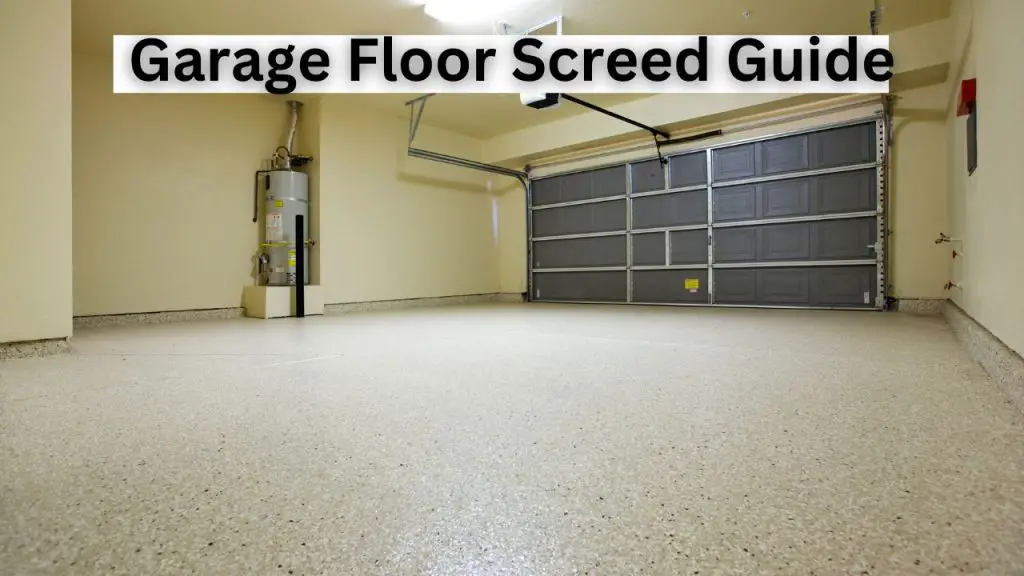Garage floor screed plays a crucial role in providing a smooth and durable surface for your garage. It acts as a leveling layer, ensuring that the flooring is even and able to withstand heavy loads, foot traffic, and vehicle movements. Additionally, garage floor screed offers excellent resistance to chemicals, moisture, and temperature changes, making it an ideal choice for garages. In this article, we will discuss the various aspects of garage floor screed, including thickness, specification, cost, and more.
Garage Floor Screed: What You Need to Know

What is Garage Floor Screed?
Garage floor screed is a specially formulated material that is applied to the concrete base of a garage floor to create a smooth and level surface. It is typically composed of cement, sand, and water, along with additives that enhance its strength, adhesion, and durability. Garage floor screed serves as a protective layer, providing a solid foundation for the final flooring material.
Why is Garage Floor Screed Important?
Garage floor screed plays a vital role in ensuring the longevity and functionality of your garage floor. It helps to:
- Level the surface
- Enhance strength
- Prevent cracking
- Improve insulation
- Resist moisture and chemicals
Garage Floor Screed Thickness
The thickness of garage floor screed depends on several factors, including the intended use of the garage, the load it will bear, and the flooring material that will be applied on top. Here are some common garage floor screed thickness options:
Thin Screed (10-40mm):
Thin screeds are suitable for light-duty applications and where space is limited. They are commonly used in domestic garages or areas with minimal traffic.
Standard Screed (40-75mm):
Standard screeds are the most commonly used option for garage floors. They provide sufficient thickness to withstand moderate loads and foot traffic.
Heavy-Duty Screed (75-100mm+):
Heavy-duty screeds are ideal for commercial garages or areas that experience heavy vehicle traffic or frequent impacts. They offer enhanced strength and durability.
Garage Floor Screed Specification
When selecting garage floor screed, it is essential to consider the specific requirements of your project. Here are some key specifications to keep in mind:
Compressive Strength:
The compressive strength of the screed determines its load-bearing capacity. For regular garage use, a compressive strength of at least 25 N/mm² is recommended.
Drying Time:
The drying time of the screed affects the overall project timeline. Rapid-drying screeds are available for faster installation and reduced waiting time.
Bonding Agents:
Depending on the type of screed and the condition of the concrete base, bonding agents may be required to ensure proper adhesion and prevent delamination.
Additives:
Various additives can be incorporated into the screed mix to enhance specific properties such as flexibility, water resistance, or chemical resistance.
Garage Floor Screed Cost
In the United Kingdom as a rough estimate, the average cost of garage floor screed in the UK ranges from £15 to £30 per square meter. It’s important to note that this cost may not include additional expenses such as labor, materials, or any specialized additives or finishes. To get an accurate cost estimate for your specific project, it is recommended to consult with professional contractors or suppliers in your area. Use our free floor screed estimation tool to get accurate measurements.
Frequently Asked Questions (FAQs)
Can I install garage floor screed myself, or should I hire a professional?
While it is possible to install garage floor screed as a DIY project, it is recommended to hire a professional for the best results. Professionals have the expertise and equipment to ensure proper mixing, application, and finishing, leading to a more durable and long-lasting garage floor.
How long does it take for garage floor screed to dry?
The drying time of garage floor screed depends on various factors, including the type of screed used, the ambient conditions, and the thickness applied. On average, screed can take anywhere from 24 hours to several weeks to fully dry and cure.
Can I apply tiles or other flooring materials directly on top of garage floor screed?
Yes, once the garage floor screed has fully dried and cured, you can apply tiles, epoxy coatings, or other flooring materials on top.
How can I maintain and clean my garage floor screed?
To maintain and clean your garage floor screed, regularly sweep away dirt and debris, mop with a mild detergent or floor cleaner, and avoid using harsh chemicals or abrasive cleaning agents that can damage the screed surface.
Can I use garage floor screed in other areas of my home or commercial space?
Yes, garage floor screed can be used in various areas, including basements, workshops, warehouses, and commercial spaces. It provides a durable and versatile flooring solution that can withstand heavy use and offer excellent protection.
How long does garage floor screed last?
The lifespan of garage floor screed depends on factors such as the quality of installation, maintenance practices, and the type of traffic it experiences. With proper installation and care, garage floor screed can last for many years without significant issues.
Conclusion
In conclusion, garage floor screed is an essential component of any garage flooring project. It provides a smooth, level, and durable surface that can withstand the demands of heavy vehicles, foot traffic, and various environmental conditions. By understanding the thickness options, specifications, costs, and frequently asked questions related to garage floor screed, you can make informed decisions and ensure a successful flooring renovation.
